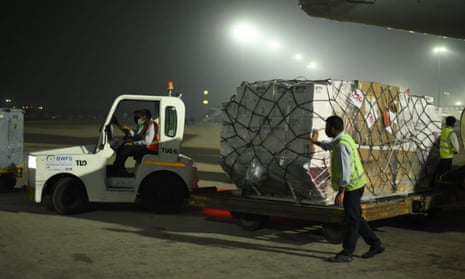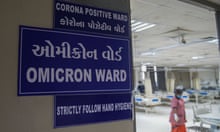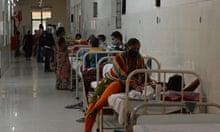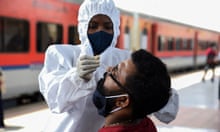The UK has been “first out of the blocks” with help for India, but will not send vaccines to the Covid-ravaged country until Britain has a surplus of supplies, the Foreign Office minister, Nigel Adams, has told MPs.
He said the UK was responding to the Indian government’s needs, and had been the first country to provide practical support “in the face of heartbreaking scenes that had shocked us all”.
But he insisted they did not need to send more vaccines to the country as the government had already donated to the Covax scheme administered by the World Health Organization (WHO).
Adams’s comments came before an announcement that the UK had ordered a further 60m doses of the Pfizer/BioNTech Covid vaccine in an effort to ensure that booster jabs can be given from this autumn. This brings the number of Pfizer doses ordered to the same level as Oxford/AstraZeneca doses; the UK currently expects to receive 100m of each.
The UK said on Wednesday it was sending further equipment and supplies to India in the form of three oxygen generation units from surplus stocks in Northern Ireland that can each be used by 50 people at a time.
They follow the sending of 495 oxygen concentrators and 200 ventilators, also from surplus stocks, which were expected to arrive this week.
Adams said the equipment from surplus stocks was based “on the most acute need indicated to us by the Indian government”. He said the UK would be looking to see if there was more to be done. Oxygen cylinders were not being sent, he said, because the Indian government said replenishment was not compatible with Indian systems.
Some Labour MPs said the help being offered was a drop in the ocean, and even Tory MPs said France and Germany were doing more by providing cryogenic containers capable of transporting liquid oxygen. One of India’s problems is transporting oxygen to the point of greatest need.
Adams questioned whether these were being provided on a commercial basis.
The shadow foreign secretary, Lisa Nandy, urged ministers to recognise that “this is now a global emergency, and the UK must ramp up delivery of life-saving equipment”. She called for the government to coordinate with the EU and to supply drugs such as remdesivir. It is estimated 17 countries have so far provided help.
Adams was pressed on whether the UK would do more to provide vaccines, but he said Britain had no surplus stock and had instead offered funding to the Covax scheme administered by the WHO to supply 1.3bn doses to up to 92 lower-income countries, including India.
He said he did not know how many of these doses were going to India, a country that has vaccinated only 9% of its population. He rejected calls to allow a patent waiver to let vaccines be produced more widely, a request supported by India and South Africa.









